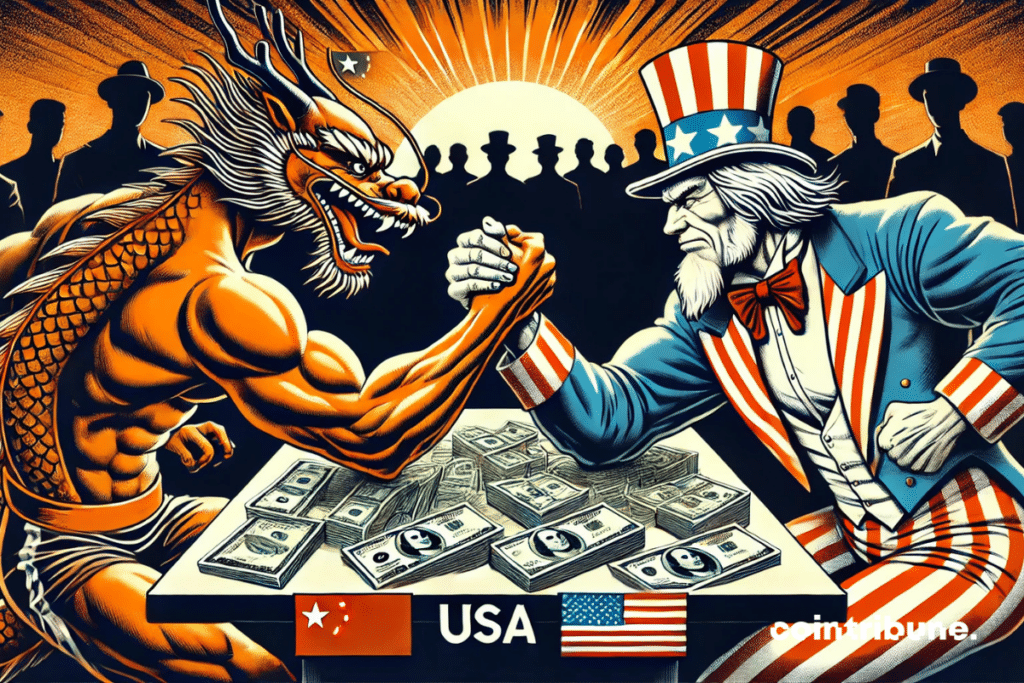Beijing Urges End To US Tariffs, Citing Risk Of Global Economic Shock
China does not intend to yield to the new American protectionist measures. In response to the tariff spike imposed by Donald Trump, Beijing is retaliating without hesitation by demanding the immediate removal of customs duties, fearing the effects of a major global economic shock.

US Tariffs: A Risky Strategy for the Global Economy
The American decision to hit China with a historic customs tax of 145% reveals the extent of an economic conflict that could tilt the global economy into a prolonged recession. Initially set at 10%, these tariffs have quickly skyrocketed, abruptly increasing the pressure on Beijing. In just a few days, the trade war has escalated from a simple diplomatic spat to a full-blown economic confrontation.
On the Chinese side, the reaction was swift. Chinese authorities immediately counterattacked with retaliatory tariffs of 125% on American products.
This retaliation marks a significant escalation that heightens uncertainty in global financial markets. Beijing is thus intent on demonstrating its determination not to yield under American pressure.
Despite a slight easing on the American side, with the temporary suspension of tariffs on consumer electronics, Beijing remains skeptical and views this decision as a timid American attempt to correct its mistakes. According to China, this tariff policy heavily undermines the balance of international trade and directly threatens global economic stability.
American Consumers, the First Victims of This Standoff
While Washington remains optimistic about the effectiveness of its tariff policy, China firmly alerts about the direct consequences for American citizens.
According to Mao Ning, spokesperson for the Chinese Ministry of Foreign Affairs, customs tariffs not only penalize Chinese companies but, above all, impose an additional burden on American businesses, which pass it directly onto consumers.
Customs tariffs do not bring manufacturing jobs back to the United States. They simply constitute an additional tax for American citizens.
This discourse, both incisive and pragmatic, highlights a reality often obscured by protectionist rhetoric: it is indeed the end consumers who foot the bill.
Despite the enthusiastic claims of the Trump administration regarding the presumed effectiveness of its tariff strategy, no trade agreement has yet been concluded with Beijing. Negotiations appear to be at a standstill, exacerbating market volatility. This diplomatic and economic deadlock reveals a potentially devastating crisis, not only for the two economic giants but also for the entirety of the global economy.
In the face of these rising tensions, the future remains uncertain. The coming weeks will be crucial in determining whether Washington and Beijing will find a compromise or if the world will have to deal with an economic crisis whose repercussions could prove more severe than expected. Amidst all these uncertainties, gold is capitalizing and reaching new heights.
Maximize your Cointribune experience with our "Read to Earn" program! For every article you read, earn points and access exclusive rewards. Sign up now and start earning benefits.

Fascinated by Bitcoin since 2017, Evariste has continuously researched the subject. While his initial interest was in trading, he now actively seeks to understand all advances centered on cryptocurrencies. As an editor, he strives to consistently deliver high-quality work that reflects the state of the sector as a whole.
The views, thoughts, and opinions expressed in this article belong solely to the author, and should not be taken as investment advice. Do your own research before taking any investment decisions.